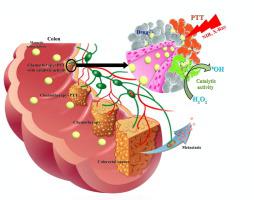Journal of Advanced Research ( IF 11.4 ) Pub Date : 2020-12-05 , DOI: 10.1016/j.jare.2020.12.001 Suliman Khan 1 , Majid Sharifi 2 , Anwarul Hasan 3, 4 , Farnoosh Attar 5 , Zehra Edis 6 , Qian Bai 7 , Hossein Derakhshankhah 8 , Mojtaba Falahati 2

|
Background
Heterocyclic compounds have always been used as a core portion in the development of anticancer drugs. However, there is a pressing need for developing inexpensive and simple alternatives to high-cost and complex chemical agents-based catalysts for large-scale production of heterocyclic compounds. Also, development of some smart platforms for cancer treatment based on nanoparticles (NPs) which facilitate Fenton reaction have been widely explored by different scientists. Magnetic NPs not only can serve as catalysts in the synthesis of heterocyclic compounds with potential anticancer properties, but also are widely used as smart agents in targeting cancer cells and inducing Fenton reactions.
Aim of Review
Therefore, in this review we aim to present an updated summary of the reports related to the main clinical or basic application and research progress of magnetic NPs in cancer as well as their application in the synthesis of heterocyclic compounds as potential anticancer drugs. Afterwards, specific tumor microenvironment (TME)-responsive magnetic nanocatalysts for cancer treatment through triggering Fenton-like reactions were surveyed. Finally, some ignored factors in the design of magnetic nanocatalysts- triggered Fenton-like reaction, challenges and future perspective of magnetic nanocatalysts-assisted synthesis of heterocyclic compounds and selective cancer therapy were discussed.
Key Scientific Concepts of Review:
This review may pave the way for well-organized translation of magnetic nanocatalysts in cancer therapy from the bench to the bedside.
中文翻译:

磁性纳米催化剂通过合成抗癌药物和促进芬顿反应作为癌症治疗的多功能平台
背景
杂环化合物一直是抗癌药物研发的核心部分。然而,迫切需要开发廉价且简单的替代品来替代高成本且复杂的基于化学试剂的催化剂,以大规模生产杂环化合物。此外,不同科学家还广泛探索了一些基于促进芬顿反应的纳米颗粒(NP)的癌症治疗智能平台的开发。磁性纳米粒子不仅可以作为合成具有潜在抗癌特性的杂环化合物的催化剂,而且还广泛用作靶向癌细胞和诱导芬顿反应的智能剂。
审查目的
因此,在本综述中,我们旨在对磁性纳米粒子在癌症中的主要临床或基础应用和研究进展以及其在合成杂环化合物作为潜在抗癌药物中的应用相关的报道进行更新总结。随后,研究了通过触发类芬顿反应来治疗癌症的特定肿瘤微环境(TME)响应型磁性纳米催化剂。最后,讨论了磁性纳米催化剂触发类芬顿反应设计中被忽视的一些因素、磁性纳米催化剂辅助杂环化合物合成和选择性癌症治疗的挑战和未来前景。
审查的关键科学概念:
这篇综述可能为癌症治疗中磁性纳米催化剂从实验室到临床的良好转化铺平道路。









































 京公网安备 11010802027423号
京公网安备 11010802027423号